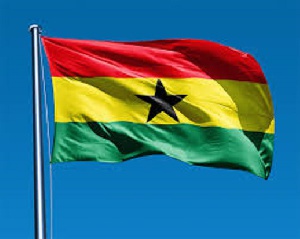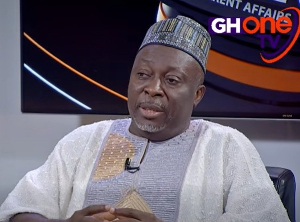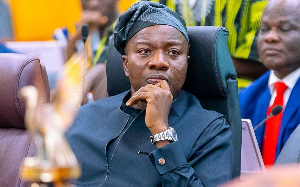Introduction
Ghana’s roll-back to democratic rule was applauded by observers around the world. Since the holding of foundational elections and the subsequent inauguration of the Fourth Republic in 1993, the country has made giant strides in its attempt at consolidating democratic practice - where the will of the people as expressed through periodic elections, no matter how imperfect those elections may be, are treated as sacrosanct with derived authority exercised to guarantee their immediate and future needs.
The National Democratic Congress (NDC) which won the first multi-party elections formed the first government under the Fourth Republic and laid the foundations for a fledging constitutional democracy. Besides the one-sided nature of the first Parliament, it passed all the necessary laws to establish the various constitutional bodies envisaged by the drafters of the constitution to guarantee a progressive democratic practice.
This effort was complimented by the Rawlings-headed executive that appointed competent persons of high repute to head these institutions through an extensive consultative process; performing with distinction. Essentially, by the year 2000, Ghana under the Rawlings-led administration had signalled her intention to the international community on her commitment to constitutional democratic practice.
In the year 2000, an amalgamation of opposition parties under the emblem of the largest opposition the New Patriotic Party (NPP) - a libertarian professing party, won the elections and ousted the NDC from government.
In 2008, - after two terms of the NPP - the NDC again came out of the trenches after a successful rebuilding exercise to win the parliamentary and presidential elections for the second time, relegating the NPP back to opposition. At this stage, commentators on Ghana’s democratic practice hailed it as passing Huntington’s electoral criteria for measuring democratic consolidation: the two-turnover test. Notwithstanding Huntington’s basic criterion for democratic consolidation, it presented more than a “fallacy of electoralism”.
Implicit in this measurement for democratic consolidation is the requirement for political office holders to discharge their duties in a manner that endears such institutions to the needs of the citizenry. Hence, a political office holder such as the president and heads of Independent Constitutional Bodies (ICBs) and state agencies are constitutionally mandated to conduct the affairs of the state within the framework of the rule of law and in a non-discriminatory manner; ensuring that policies that emanate from constitutionally mandated governance institutions and other state entities ameliorate the plight of the citizenry and transforms society.
More so as the discharge of their duties are fundamental to the quality of democracy in Ghana. Despite pockets of flaws on the part of previous presidents in ensuring the latter and spirit of the 1992 Constitution and constitutionalism, the current display of naked disdain for the rule of law is biting, and dangerous to Ghana’s democratic stability at the least.
Since January 2017 when President Akufo-Addo swore the oath of Office and allegiance to the people of Ghana, several of his actions and inactions have been disturbingly questionable and may potentially threaten the democracy, peace and stability of the state. These actions include abuses of political and constitutional rights, the disenfranchisement of large sections of the population and creeping institutional decay.
Constitutionalism in recent times
The fundamental law of the state is generally referred to as the Constitution. The Constitution may or may not be written. For example, unlike Ghana, the UK and Canada have unwritten Constitutions. This simply implies that nothing exists as a single physical or virtual document that contains all the sufficient – fundamental - laws necessary to run the affairs of the state. At best, these laws - statutes and customary - are scattered and operate in relation to each other.
Ghana’s is the 1992 Republican Constitution. The Constitution provides the legal remits for the exercise of governmental power. In other words, what the government can or cannot do is dictated by the 1992 Constitution. The primary function is to restrict governmental power. Ghana’s constitution envisages the potential abuse of constitutional powers; hence, has provided “implementation framework provisions” within and according to which these powers are to be exercised.
The entire articles under the directive principles of state policy at chapter six (6), code of conduct for public officers under chapter twenty-four (24), and particularly, article 296 which governs the exercise of discretionary powers in the constitution are “bedrock” provisions for constitutionalism in Ghana.
Constitutionalism underscores the application of democratic principles, protocols, and conventions alongside the exercise of constitutional power within the framework of the rule of law. Fortunately for Ghana, some of these democratic principles and conventions that enforce constitutionalism have been codified in the 1992 Constitution.
These principles and conventions coupled with the rights and duties of political office holders, independent constitutional bodies, state agencies and the Ghanaian citizen seek to work towards the realization of the maximalist conception of democratic consolidation – the habitualization theory.
However, the exercise of governmental powers and governmental actions taken by the President Akufo-Addo government leave much to be desired. It rather appears – contrary to the dictates of the constitution – the extent of arbitrariness and non-inclusivity of the exercise of government power is disturbingly on the rise. Such actions contribute to deeply bruising the rule of law.
The extent of arbitrariness has risen to the situation where constitutional provisions are read and applied in a narrow and self-serving manner even in the face of the rule of law, natural justice, and the “implementation provisions” in the Constitution. Perhaps, it is important to note, that, in a constitutional democracy, it is not enough to say that the government has the legal power to do an activity. Rather, the manner and how the act of the government is done is imperative, if not fundamental. A critical question is whether the said act was done in accordance to the rule of law and the principles mentioned above.
Debilitating events
As noted in the previous section the actions of President Akufo-Addo evoke the sense that electoral democracies regardless of the regularity of elections meant to foster competition of ideas can be illiberal: coexisting with systematic abuses of political and constitutional rights, and laying the foundations for instability – eroding the gains of the democratic practice thus far. A few of the major debilitating events – the dark spots – under the current government is highlighted below.
Interference in the life of an Independent Constitution Bodies – Ghana’s Electoral Commission: For the first time in the history of Ghana’s Fourth Republican constitutional democracy, the electoral commissioner and her two other deputies were removed from office under disturbingly undemocratic circumstances.
The removal occurred at the back of public pronouncements made by President Akufo-Addo – then flagbearer – and members of the New Patriotic Party on their mistrust and dislike for the electoral commissioner owing to the fact that she was appointed by former President John Mahama.
A doubtful petition by faceless persons was allegedly sent to the President regarding the removal of the former boss of the Electoral Commission (EC) – Mrs. Charlotte Osei. Aside the fact that the identities of the alleged petitioners were never known, the main basis for the removal was on an alleged procurement infraction. It is important to note that procurement is incidental to, but not part of, the express core functions of the EC under article 45.
The drafters of the 1992 Constitution envisaged a dark period as this where a sitting president could tamper with the role and functions of ICBs like the EC. It is for this reason that the Constitution granted security of tenure and made it uneasy for any sitting president to arbitrarily and without justifiable constitutional and democratic cause remove any head of the ICBs. Ghana’s Procurement Act provides for appropriate remedies when procurement infractions are committed.
Surprisingly, President Akufo-Addo, who himself is a lawyer, conveniently bypassed the Procurement law and the remedies therein for procurement breaches, and, rather, removed the EC boss loosely on grounds of stated misbehaviour under article 146 of the Constitution. A careful and sober reading of the Constitution and particularly, article 146 reveals that the said “misbehaviour” of the head of any ICB must necessarily relate to the core, and not incidental functions of the head and ICB in question.
The interesting episode was that, the President Akufo-Addo appointed Chief Justice of Ghana, Ms. Sophia Akuffo, who formed the committee that investigated the EC boss and recommended for her removal, was herself a subject of a petition to the President seeking her removal as Chief Justice.
Though the petitioners against the Chief Justice were publicly known and the issues they raised appeared very convincing, President Akufo-Addo, unlike in the Charlotte Osei case, never acted on the said petition against his appointed Chief Justice, Ms. Sophia Akuffo. A clear case of selectivity and arbitrariness?
Many questioned the basis for such a delicate move by President Akufo-Addo since this was a clear slap on article 46 of the Constitution which guarantees the independence of the Commission. At this point it was obvious to everyone the piercing of the democratic and electoral soul of the country through the long arms of arbitrariness and the relegation of the rule of law.
To the extent that one of Ghana’s seasoned journalist who is a known sympathizer of the NPP and the Akufo-Addo Government took the government to court on the matter but unsurprisingly lost. This has become a dangerous scar and unfortunate precedent for democratic governance in Ghana. The question is this: with President Akufo-Addo setting the pace, will successive governments and presidents follow same? Hopefully, not.
The Electoral Commissions Limited Registration Exercise: Ghana will be having district assembly – local government – elections at the end of this year. As has been the practice, there is the need for the review of the voter’s register including the registration of new eligible voters. Indeed, it’s a democratic and constitutional right of the new eligible voters to be registered so they can vote.
Democracy rests on some core pillars including people participation. Political participation is a human right. Political participation operates from both the "demand and supply" perspective. The demand side is the people’s willingness (and, indeed, including even when the people are unwilling) to engage in the democratic space. The supply side is the state's (including its institutions) unbridled duty to provide every reasonable means necessary to facilitate and realise the people’s right to political participation.
The right to vote is at the heart of political participation. Voter registration is a right, incidental to the right to vote. The state, and in this case, Ghana's Electoral Commission is therefore obliged to provide every reasonable facilitative means to enable every potential voter to effectively register. Rather, and in an apparent move to disenfranchise many Ghanaians, the President Akufo-Addo newly elected electoral commissioner and her deputies have decided to relocate the voter registration centres that hitherto were stationed at the polling stations - closer to the people - in the constituencies, to the district centres - far away from majority of the people in the upcoming limited registration exercise.
The new EC is bent on going ahead regardless of serious reservations by all the opposition political parties including the NDC. Indeed, the NDC has projected that, should the EC go ahead with such a move, one million new voters stand the risk of being disenfranchised. The reality is that; by such a move, eligible voters are expected to travel miles from their polling stations to the district centres to register.
The long distance and economic cost to engaging in this exercise is enough disincentive to the potential registrant, especially, those from poor economic background. This is a clear case of discrimination. How does such a move deepen and grow the democratic process specifically the people's right to political participation in Ghana? Clearly, this move by the new EC has the tendency to create an electoral atmosphere of low confidence in the ability of the EC to deliver a free and fair elections in 2020.
Piercing the veil of academic freedom in Ghana: Constitutional democracies are sustained by the quality of ideas, mostly from its intellectuals – academics – through various forms. The production and exchange of such ideas within the confines of the provisions of the law nourishes the socioeconomic and political development of states. However, the days of academic freedom in Ghana appears to be coming to an end with a proposed bill that virtually subjects the work of academics to the whims of the Education Minister. A situation which, not even military regimes have attempted to implement in the history of Ghana.
Recently, the President Akufo-Addo government has been on a roller-coaster ride with the renaming of tertiary institutions across the country. The approach to the renaming of tertiary institutions lacked in-depth consultation and respect for political sensibilities. This move caused one of Ghana’s former presidents, John Jerry Rawlings to issue a press statement asking that he is not named after the University of Development Studies (UDS) as has been the intention of the government. Many Ghanaians heralded the stance of J.J. Rawlings.
Additionally, the physical interference by government in the management of tertiary institutions has been disturbing. For instance, the way Professor Mawutor Avoke and Dr. Theopholus Senyo Ackorlie were removed from office as Vice-Chancellor and Finance Officer, respectively of the University of Education, Winneba (UEW) for alleged abuse of office and procurement breaches, has been described as smacking of ethnicity by the Harvard trained law Professor, Raymond Atuguba.
Related issues to their removal were challenged in court. Recently, a leaked report from the Ghana Economic and Organised Crime Office (EOCO) which has been cited by all the major media outlets cleared the sacked officers of any wrong doing. The report specifically mentioned that the basis on which the two were removed from office was zilch. Meanwhile, President Akufo-Addo fully participated and sworn-in the new Vice-Chancellor of the University of Winneba when it was public knowledge that the court in a couple of days would be giving its ruling in University of Winneba case.
Why would an acclaimed human rights and “consummate” democrat in the calibre of President Nana Addo want to spearhead such an illiberal move? Anyway, any observer of the Ghanaian political scene would note that general freedom of speech is gradually becoming a crime with journalists seeking refuge outside of the country or elsewhere – a situation that is fast degenerating to the extent that a senior broadcaster has retorted that, ‘you can chase out all journalists but social media will remain’. It is therefore not surprising Ghana’s record on major international ranking platforms is worsening.
The Ghana Card Registration Exercise – National Identification Authority (NIA): The institution of a universal identity card is laudable; especially when it finally took over a decade for the actual process of issuing a single identity card to all residents in Ghana to be used across different platforms. However, the process has been fraught with serious legal breaches, with the potential to cause integrity problems as indications thus far are that the Ghana card would form the basis for compiling a new voter register towards the 2020 general elections.
Issues of eligibility and requirements for registration are exclusionary: the production of a digital address in a country where a considerable segment of the population do not own a smartphone and just about 35% of the population are connected to the internet . The insistence on meeting these requirements, 31 in total has been exacerbated by the ruling of the Hight Court (Human Rights division) that makes them mandatory. The sum effect of the court’s decision as it stands and the attitude of the NIA is that a significant proportion of potential voters’ risk being excluded from the database for the voters roll.
Conclusion
In this essay we have sought to highlight some of the events under President Akufo-Addo’s administration that do not meet modern democratic standards or undermine the gist of a consolidating constitutional democracy. The idea of constitutionalism is not merely the adherence to the provisions a constitution.
Its essence is that government and state institutions should be legally limited in performing their functions, with their authority depending on enforcing these limitations. Put differently, the constitution must not be seen to be only working, constitutionalism requires the rule of law to enhance the living circumstance of the citizenry.
After uncertain beginning to constitutional democracy under Ghana’s Fourth Republican dispensation in 1993, there have been qualitative leaps in attempts by previous administrations at consolidating her democracy firmly hinged on constitutionalism.
However, recent events under the current administration after its inauguration on 7 January 2017 leaves a lot to be desired by any observer of Ghana’s democratic space.
The arguably unsatisfactory performance of the current administration does not only erode some of the gains made by previous administrations but sets a dangerous precedent that subsequent administrations might find difficult to undo. This is especially so as supporters of whichever political party beside the NPP that may win the next general elections on 7 December 2020 would want their party to maintain the status-quo – a situation that would be difficult to manage with the looming fear of losing the next elections.
Furthermore, for whatever reasons, the loud silence of hitherto very vocal and active Civil Society Organisations known for their policing duties over the activities of previous government – especially the immediate past administration sends a very bad signal to all observers both locally and internationally. It suggests a tacit complicity in the ongoing disturbing actions of the President Akufo-Addo government.
The present political polarization along partisan lines present an imminent challenge to undoing the errors done by President Akufo-Addo’s government. Obviously, opposition political parties which are polarised institutions by themselves cannot be relied on to perform this task. However, there’s a slim glimpse of hope that lies with progressive forces such as the Trade Union Congress, the critical sections of the Youth, the Ghanaian academy and other similar organization to contribute towards reforming Ghana’s democratic space by encouraging civic capacity, citizen activism, and electoral responsiveness.
The reform agenda must equally forestall institutional tyranny. It should ultimately lend itself to reforms that would create a conducive environment for a more substantive democracy – one that provides a mechanism to ensure that the people have the final say over important governance issues or questions. To achieve this would require invariably investment of an enormous amount of critical intellectual energy by all progressive forces. It is doable.
Opinions of Wednesday, 24 July 2019
Columnist: Michael Abbey and Kafui Tsekpo















